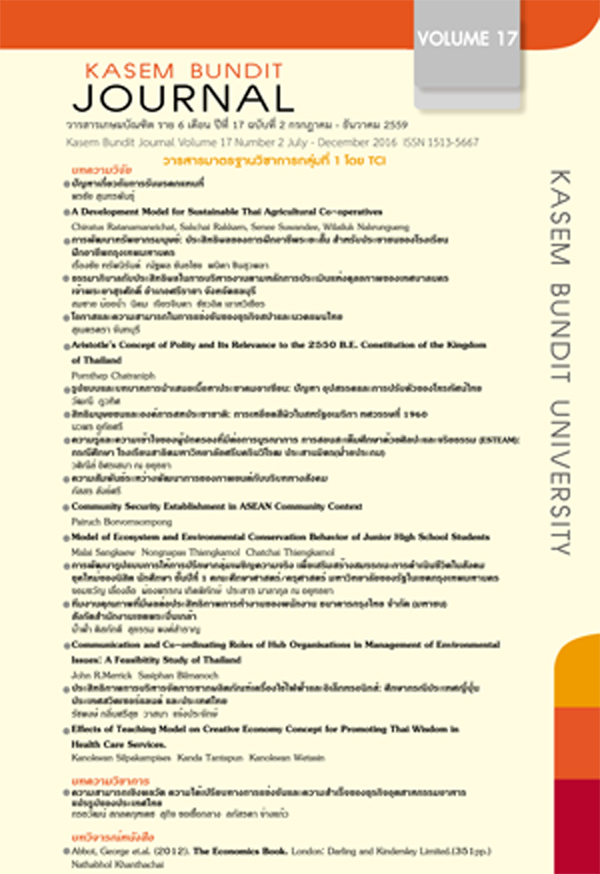Effects of a Teaching Model on the Creative Economy Concept for Promoting Thai Wisdom in Healthcare Services.
Keywords:
Thai wisdom, Teaching model, Creative Economy concept, Healthcare services ภูมิปัญญาไทย รูปแบบการสอน แนวคิดแนวเศรษฐกิจสร้างสรรค์ บริการสุขภาพAbstract
Abstract
This research surveyed nursing students’ learning outcomes from the Creative Economy concept, employing the self-learning (Constructivism) theory as a basis in the ‘Thai Wisdom in Healthcare course’. The sample consisted of 57 third-year nursing students selected by purposive sampling. The research instrument was a questionnaire with verification of reliability using the Cronbach’s Alpha Coefficient, and data were collected on five occasions. The data analysis was conducted with the SPSS. The study revealed that students’ theoretical academic achievement resulted in a mean score of 82.33 percent and a practical ability mean score of 76.98 percent. Clients at the Agricultural Fair were satisfied with the academic services, with a mean score of 4.60, at an ‘excellent’ level. Learning outcomes in applying Thai healthcare wisdom in solving health problems showed a mean score of 4.33, SD = .70, at a ‘high’ level. Students’ self-appraisal of their knowledge gained showed a mean score of 4.09, SD = .67, with a competency mean score of 4.09, SD = .71, and an attribute mean score of 4.32, SD = .75, at a ‘high’ level. Results from a focus group interview showed that students were quick to understand the subject, responsible, and able to work as a team. They were also able to integrate the knowledge of Thai wisdom into the creative process, producing herbal compresses, food, and juices, and using skills in the art of massage to reduce stress, thus providing value-added health services in the process of solving health problems.
บทคัดย่อ
การวิจัยครั้งนี้เป็นการศึกษาเชิงสำรวจผลการจัดรูปแบบการสอนตามแนวคิดเศรษฐกิจสร้างสรรค์ในการส่งเสริมการนำภูมิปัญญาไทยไปใช้ในการดูแลสุขภาพผู้รับบริการ โดยใช้ทฤษฎีการเรียนรู้ด้วยตนเอง (Constructivism) เป็นฐาน เลือกกลุ่มตัวอย่างแบบเจาะจงคือนิสิตพยาบาลชั้นปีที่ 3 จำนวน 57 คน ใช้แบบสอบถามทีผ่านการทดสอบความเชื่อมั่น Cronbach’s Alpha coefficient และเก็บข้อมูลวิจัยจำนวน 5 ครั้ง ตามประเด็นหลักที่ผู้วิจัยสร้างขึ้น การวิเคราะห์ข้อมูลโดยโปรแกรมสำเร็จรูปSPSS ผลการวิจัยพบว่า ผลสัมฤทธิ์การเรียน ภาคทฤษฎีร้อยละ 82.33 ภาคทดลองมีคะแนนเฉลี่ยเท่ากับ 76.98 ผลความพึงพอใจของผู้รับบริการในเกษตรแฟร์ในงานภูมิปัญญาไทยกับการส่งเสริมสุขภาพ มีค่าคะแนนเฉลี่ย 4.60 อยู่ในระดับดีมากที่สุด และผลความคิดเห็นของผู้รับบริการในชุมชนต่อนิสิตในการการใช้ภูมิปัญญาไทยในการดูแลสุขภาพและแก้ปัญหาสุขภาพในการฝึกปฏิบัติการพยาบาลครอบครัวและชุมชน2ของนิสิตพยาบาล มีค่าคะแนนเฉลี่ย 4.33 , SD= .70 อยู่ในระดับดี ผลการประเมินตนเองของนิสิตด้านความรู้ มีค่าคะแนนเฉลี่ย 4.09 SD=.67 ความสามารถมีค่าคะแนนเฉลี่ย 4.09 SD.=71 และคุณลักษณะมีค่าคะแนนเฉลี่ย 4.32 SD.75 ซึ่งในระดับ ดีมากทุกด้าน ผลการสนทนากลุ่ม พบว่ากลุ่มนิสิตมีความสามารถเรียนรู้ได้เร็ว รับผิดชอบ สามารถบริหารจัดการ ทำงานเป็นทีม มั่นใจ และสามารถเชื่อมโยงความรู้ภูมิปัญญาไทยกับความรู้ทางการพยาบาลสามารถใช้กระบวนการคิดแบบสร้างสรรค์ผลิตภัณฑ์จากสมุนไพรลูกประคบ อาหาร น้ำสมุนไพร และทักษะการนวดคลายเครียดทำให้เพิ่มมูลค่าบริการสุขภาพ และต่อยอดคิดแก้ไขปัญหาสุขภาพได้ดี เหมาะสมกับสถานการณ์
Downloads
Published
How to Cite
Issue
Section
License
ทัศนคติ ความคิดเห็นใด ๆ ที่ปรากฏในวารสารเกษมบัณฑิตฉบับนี้เป็นของผู้เขียน โดยเฉพาะ มหาวิทยาลัยเกษมบัณฑิตและบรรณาธิการ ไม่จำเป็นต้องมีความเห็นพ้องด้วย







